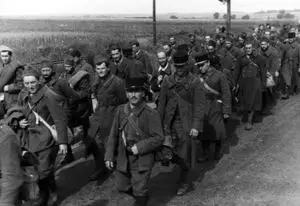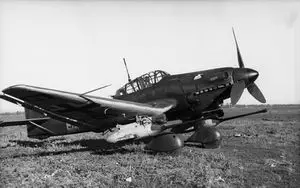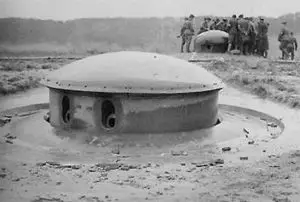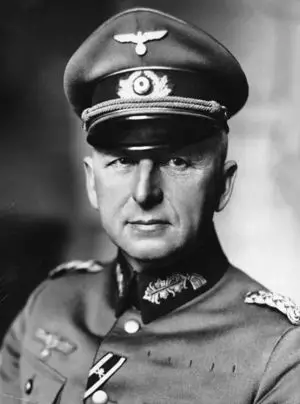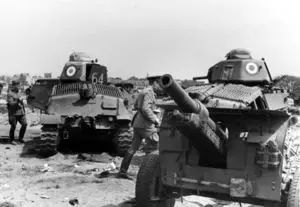Why was France defeated in 1940
The fall of France in 1940 was sudden and shocking. French leaders believed that they had prepared for a potential war with Germany and were well prepared. Tragically, they were not. Within months of the German invasion, France collapsed. Why did France surrender so quickly?
In September 1939, the German war machine invaded Poland, and World War II began. France and Britain declared against Germany in 1939. The French army was in theory as strong as Germany's. It had a vast Empire and a sophisticated arms industry. It had also established a series of fortifications along the country's eastern border along with Germany, known as the Maginot Line. The Line was designed to keep German forces out of France. Initially, France and Great Britain appeared to be a match for Germany.
However, in weeks in the late spring and early summer of 1940, it became clear that France was woefully unprepared for the German onslaught. France suffered a humiliating defeat and was quickly occupied by Germany. Its failure was a result of a hopelessly divided French political elite, a lack of quality military leadership, rudimentary French military tactics. On the battlefield, France faced a vastly more prepared German army that utilized both more advanced weapons and sophisticated tactics. It was a mismatch.
What happened to France after World War One?
France had been fearful of Germany ever since the Franco-Prussian War of 1870-71. In this war, the Prussians had quickly defeated the French and occupied much of the country. In World War I, The Germans had come very close to defeating the French, and without allied assistance, the country would have lost to Germany. Despite being among the victors in World War One, the French still dreaded a conflict with Germany. During the Versailles treaty negotiations after the collapse of Germany during World War, French negotiators were adamant Germany's military had to be neutralized.
The French, led by Prime Minister Clemenceau, adopted a hard line towards the Germans in 1918-1919. There was a thaw in the Franco-German relationship in the mid-1920s, and there was the hope of a genuine rapprochement between the two largest powers in continental Europe.
However, the Great Depression and the rise of Hitler meant that the French were suddenly faced with a potentially aggressive regime in Germany. The French adopted a diplomatic policy of appeasement and sought to placate Hitler by offering him concessions, such as allowing him to re-militarize the Rhineland. Still, France took no chances and began to prepare their defenses.
The French devoted a considerable amount of resources and capital to the construction of the Maginot Line. This defensive line was named after a French Defence Minister. The French constructed a long line of fortifications along their eastern border with German. It stopped at the Belgian border. The French stationed all their forces behind the Maginot Line and adopted a defensive posture.
When Did Germany Invade France?
In September 1939, the French with the British declared war on Germany after Hitler invaded Poland. For several months, there was little or no activity on the Western Front. This period was known as the 'Phoney War.' However, in the Spring of 1940, the Germans shifted their attention west and went on the offensive.
The Battle of France started on the invasion on May 10th, 1940, and only lasted only 46 days. Paris fell to the Germans on June 14th, after the virtual collapse of the French army. French Prime Minister Paul Reynaud resigned on June 16th during the catastrophe. His successor, Marshal Philippe Pétain, began negotiations to end the war. By June 25th, France was forced to surrender.
The German army suffered 157,000 casualties during the invasion of France, but the Allies' losses were considerably worse. The Allies lost over twice as many men and overall had 360,000 casualties. A further two million men were captured. Some 300,000 British and French troops escaped the Germans after being evacuated by naval forces at Dunkirk. The Germans occupied the majority of France. In the south of France, the Vichy Regime established a semi-autonomous political entity. Vichy maintained control over the majority of the French Colonies.[1]
How did the German Army move so quickly through France?
Between the world wars, the German army developed the Blitzkrieg tactics. This strategy was based on high-speed and mobile attacks on the enemy’s weak points, and it proved devastating in France.[2] The German victory was founded on a plan developed by the great military strategies, General Erich von Manstein. He adopted the Schlieffen Plan that was almost successful in WW I.[3]
However, rather than advance on a broad front through Belgium, the Germans focused two-thirds of their forces, including most of their tanks, in the Ardennes region of Belgium. France and Belgium did reinforce the fortifications in this region because they assumed that the terrain was unsuitable for tanks. When the Germans attack came through the Ardennes, they caught the French and their British allies by surprise because the French believed it was impassable to tanks.
Having successfully made their way into France, German forces then employed a tactic known as the ‘sickle stroke’. Sweeping across the northern plains of France at great speed, they divided the French and British forces into two parts. The British army was left isolated in Belgium and the French were left to bear the brunt of the German forces. [4]
The German army was substantially better than the French and the British. Hitler had built up the German army and, in particular, the air force (Luftwaffe). The Germans had developed superior weapons. In particular, they had developed superior aircraft such as the Stuka dive bomber and the Messerschmitt ME fighter plane, which wreaked havoc on the allies.[5] The Germans placed a great deal of emphasis on mobile and armored warfare. They had superior tanks, such as Panzer Mk iv, which easily overcame the allies in almost every tank engagement in the Battle of France. Even though the German army was superior to the French in many ways the Fall of France was not inevitable.
Was France prepared for the German invasion?
French military tactics were extremely outdated at the start of the war. They had failed to recognize that warfare had fundamentally changed since the First World War. They were over-reliant upon the Maginot Line, and they believed that this would stop any German invasion in its track. Since they did not believe that could defeat Germany outright, they hoped that the Maginot would drive up casualties and Germany to the negotiating table. They relied on defensive tactics and failed to grasp the impact of modern tanks and aircraft.
The over-reliance on the Maginot Line meant that they were too defensive. The Maginot Line also failed to protect the entire French border. Instead of attacking France directly, Germany avoided the Maginot line by invading Belgium. French military planners have failed to plan for this contingency. The defensive line only partially defended France and indeed left the country open to an invasion via Belgium. The French High Command also failed to launch an offensive against Germany after the German attacked Poland.
The French army simply hid behind the Maginot Line and waited for the Germans to attack. When the Germans finally did attack through the Ardennes, the French army was trapped in bunkers, and its fortifications were immediately outflanked. Even when the Germans invaded Belgium, the French General Staff continued with their cautious policy and were slow to respond to the German threat.[6]

While the French army was large and had been well resourced, it had not been modernized. It was still based on the idea that the next war would resemble the Great War. As a result, the French did not believe that any war with Germany, would be a mobile one, but rather a war of attrition. This meant that they failed to develop tank tactics that took advantage of their tanks offensive capabilities.[7] Even when the French did effective field equipment, such as the SOMUA S35 tanks, they were mismanaged by French cavalry commanders. The Somua S35 tanks did not realize their true potential until German commanders commandeered them and utilized on the Eastern Front.
During the invasion, German Panzer tanks quickly overcame the French defenses on the plains of Northern France. The French air forces were also no match for the Germans in aerial combat. The French army was unable to cope with the German Blitzkrieg tactics and was quickly defeated after only six weeks of fighting.[8]
Why did France have Poor Military and Political Leadership?
In 1940, the French general staff was led by General Maurice Gamelan, an officer widely respected. A veteran and war hero of the First World War, he was credited with developing the strategy that led to the decisive French victory at the Marne in 1914. He had also tried unsuccessfully, to modernize the army. But Gamelin was suffering from a serious illness, whose symptoms included poor concentration levels, memory loss and other cognitive difficulties. Gamelin’s memoirs, published after the war, showed symptoms of paranoia and delusions of grandeur.[9] The military leadership below Gamelin was generally poor. They were slow to respond to the Germans, and there was a marked reluctance to take any initiative and go on the attack. The political leadership of France was also very poor. According to one French commentator during the war, they could not inspire the French people, they were more interested in fighting among themselves that the Germans.[10]
France was bitterly divided between the left and the right. This lack of unity in France was crippling at a crucial juncture in the war. The division also extended to the relationships between the military and political leadership of France. The French Generals were rights wing and distrusted the left-wing politicians who ran France. French ministers also did not trust the judgment of their generals. The French officer corps was more worried about a Communist revolution than a German invasion.
For example, General Weygand was more concerned with maintaining social stability in the wake of the German invasion than actually fighting the Germans. Many later accused some French Generals of being traitors. Perhaps the greatest weakness in the French leadership was that they did not have a true war leader; as one Frenchman stated in 1942 they ‘had no Churchill’. If France had a leader of the caliber of Clemenceau in 1940, perhaps the outcome of the Battle of France could have been different. [11]
The Fall of France - What role did defeatism play?
Related DailyHistory.org Articles
France was a powerful country with a large army and a vast Empire that stretched around the globe, but it was not cohesive. It had stark political conflicts, and many politicians were more loyal to their political party than their country. People on both the extreme Left such as the Communists or the extreme right hated the French government so virulently, their support of the French government could be best described as half-hearted after the German invasion.
Many ordinary people were disgusted with the leaders of the Third Republic, who were widely seen as professional politicians who were both venal and corrupt.[12] Furthermore, defeatism was rampant at the start of WW II. France had a low birth rate, and many were convinced that the country was degenerating, based on ideas current at the time. [13] The cultural pessimism in France meant that many, in the political and military elite believed that France could not defeat Germany and that any efforts to resist the Germans were pointless. Many people believed that France was a nation in decline and that her greatest days had passed. This led to a spirit of defeatism in France in the Spring and Summer of 1940, that played an important role in the Fall of France. Despite the valiant efforts of many French men against the German invasion, the French government and military were ill-equipped both politically and militarily to meaningfully contest Germany. [14]
Conclusion
While France was protected by the Maginot Line and a fairly large army, it put up little resistance to Germany. It only took a few weeks for the entire country to fall. The reasons for the sudden defeat of France in 1940 were numerous and varied.
They included a failure of leadership, both at the military and the political level. The army of France was not only poorly led but had been equipped with inferior arms and equipment. Moreover, the Maginot Line not only failed to protect France, but it encouraged a defensive mentality that allowed the Germans to take the initiative at crucial points during the invasion. The French public was also bitterly divided.
These political divisions and incompetent leadership convinced many French citizens that their country could not defeat Germany. All these factors combined ensured a swift between May and June 1940.
References
- Jump up ↑ Bond, Brian, "Britain, France, and Belgium, 1939–1940". (London, Brassey's, 1990), p.178
- Jump up ↑ Bond, p. 111
- Jump up ↑ Bond, p. 117
- Jump up ↑ Blatt, Joel, The French Defeat of 1940: Reassessments (Providence, RI, Berghahn, 1997), p. 111
- Jump up ↑ Blatt, p. 117
- Jump up ↑ Cooper, M. The German Army 1933–1945, Its Political and Military Failure. (Briarcliff Manor, NY: Stein and Day, 1978), p. 201
- Jump up ↑ Copper, p, 137
- Jump up ↑ Copper, p, 134
- Jump up ↑ Jackson, Julian T. The Fall of France: The German Invasion of 1940. (Oxford UP, 2003), p. 234
- Jump up ↑ Jackson, p. 235
- Jump up ↑ Why Did the French Army Collapse So Quickly? – Omnibooks Magazine, (London July, 1942), p. 6
- Jump up ↑ Jackson, p.117
- Jump up ↑ Bloch, Marc, Strange Defeat: A Statement of Evidence Written in 1940 (New York, NY: Norton, 1946), p. 117
- Jump up ↑ Copper, p, 144
Admin, Ewhelan and EricLambrecht Updated January 18, 2019
